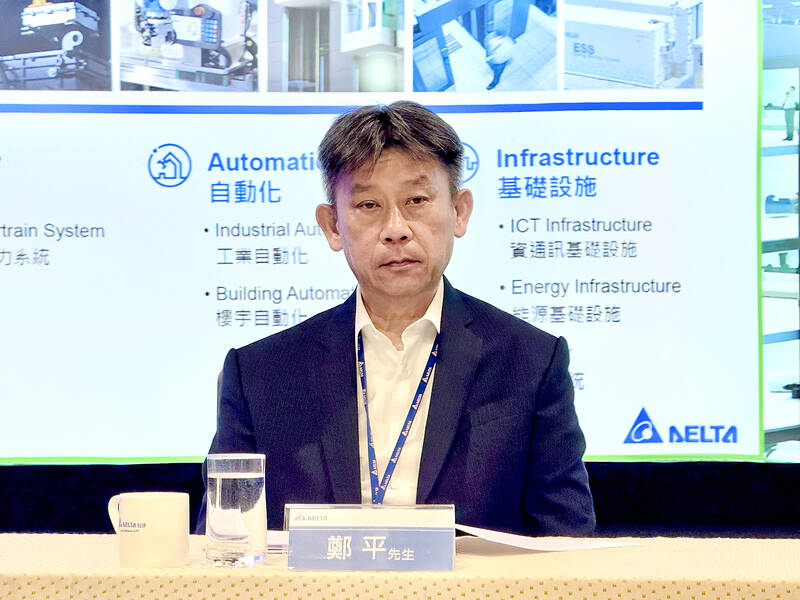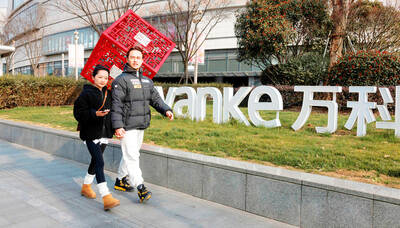Power supply and electronic components maker Delta Electronics Co (台達電) yesterday said that revenue this quarter would continue to grow sequentially, as cloud service providers in North America continue to increase their capital expenditures, which would benefit the company’s shipments of power supplies and heat dissipation parts for data centers.
The company expects its power solutions for infrastructure projects to see a marked increase in shipments this quarter, but its power electronics business would likely see sales flat or fall slightly from last quarter, the Chinese-language Liberty Times (the Taipei Times’ sister newspaper) reported on its Web site yesterday, citing Delta chief executive officer Cheng Ping (鄭平).
The power products for the transportation segment would see sales grow steadily, but shipments of power components for automation businesses still face unfavorable macroeconomic conditions this quarter, Cheng said at a quarterly earnings conference in Taipei.

Photo: Fang Wei-chieh, Taipei Times
Meanwhile, the company’s gross margin this quarter is expected to drop slightly from 34.93 percent last quarter, with the margin of information and communications technology products likely to increase, while the margins of other products remain flat or decline, the company said.
Next year, artificial intelligence (AI) would still be a hot topic and the industry’s growing interest in AI would continue bolstering the company’s power supply business, Cheng said.
However, he said the company would see order loss for DC-DC products for the next-generation Nvidia Corp GB200 servers, which is expected to affect its revenue by up to 25 percent.
The company’s overall revenue would still grow steadily next year on the back of support from other customers, he said.
Cheng’s remarks came as the firm posted third-quarter results that broadly beat expectations.
Third-quarter revenue was NT$112.2 billion (US$3.5 billion), up 4.08 percent year-on-year, but below market expectations due to lower shipments of power products for electric vehicles and industrial automation projects as well as unfavorable foreign exchange rates, it said.
Net profit last quarter marked the highest level for the July-to-September quarter on record, rising 31.79 percent from a year earlier to NT$12.34 billion, with earnings per share of NT$4.75, it said.
Thanks to a better product mix and inventory improvements, its gross margin increased 5.36 percentage points to 34.93 percent and operating margin improved 3.6 percentage points from a year earlier to 14.64 percent, it said.
Power electronics contributed 56 percent to the company’s revenue last quarter, followed by power solutions for infrastructure projects at 22 percent, power products for the automation sector at 12 percent and those for the transportation segment at 10 percent, company data showed.
Delta said data centers composed of AI servers consume considerable amounts of electricity.
The US market might double its power consumption by 2030, reaching 400 terawatt-hours, it said.
As power consumption increases, heat dissipation requirements would also increase, the company said, adding that the newest AI data centers would use liquid-to-liquid cooling systems, which would be a major growth driver for the company in the next two years.
The company has operations in Taiwan, China, India, Thailand, the US and eastern Europe.
In the first nine months of this year, its capital expenditure totaled NT$26.3 billion, the company said.

CHIP RACE: Three years of overbroad export controls drove foreign competitors to pursue their own AI chips, and ‘cost US taxpayers billions of dollars,’ Nvidia said China has figured out the US strategy for allowing it to buy Nvidia Corp’s H200s and is rejecting the artificial intelligence (AI) chip in favor of domestically developed semiconductors, White House AI adviser David Sacks said, citing news reports. US President Donald Trump on Monday said that he would allow shipments of Nvidia’s H200 chips to China, part of an administration effort backed by Sacks to challenge Chinese tech champions such as Huawei Technologies Co (華為) by bringing US competition to their home market. On Friday, Sacks signaled that he was uncertain about whether that approach would work. “They’re rejecting our chips,” Sacks

Taiwan’s long-term economic competitiveness will hinge not only on national champions like Taiwan Semiconductor Manufacturing Co. (TSMC, 台積電) but also on the widespread adoption of artificial intelligence (AI) and other emerging technologies, a US-based scholar has said. At a lecture in Taipei on Tuesday, Jeffrey Ding, assistant professor of political science at the George Washington University and author of "Technology and the Rise of Great Powers," argued that historical experience shows that general-purpose technologies (GPTs) — such as electricity, computers and now AI — shape long-term economic advantages through their diffusion across the broader economy. "What really matters is not who pioneers

BUBBLE? Only a handful of companies are seeing rapid revenue growth and higher valuations, and it is not enough to call the AI trend a transformation, an analyst said Artificial intelligence (AI) is entering a more challenging phase next year as companies move beyond experimentation and begin demanding clear financial returns from a technology that has delivered big gains to only a small group of early adopters, PricewaterhouseCoopers (PwC) Taiwan said yesterday. Most organizations have been able to justify AI investments through cost recovery or modest efficiency gains, but few have achieved meaningful revenue growth or long-term competitive advantage, the consultancy said in its 2026 AI Business Predictions report. This growing performance gap is forcing executives to reconsider how AI is deployed across their organizations, it said. “Many companies

China Vanke Co (萬科), China’s last major developer to have so far avoided default amid an unprecedented property crisis, has been left with little time to keep debt failure at bay after creditors spurned its proposal to push back a looming bond payment. Once China’s biggest homebuilder by sales, Vanke failed to obtain sufficient support for its plan to delay paying the 2 billion yuan (US$283.51 million) note due today, a filing to the National Association of Financial Market Institutional Investors showed late on Saturday. The proposal, along with two others on the ballot, would have allowed a one-year extension. All three